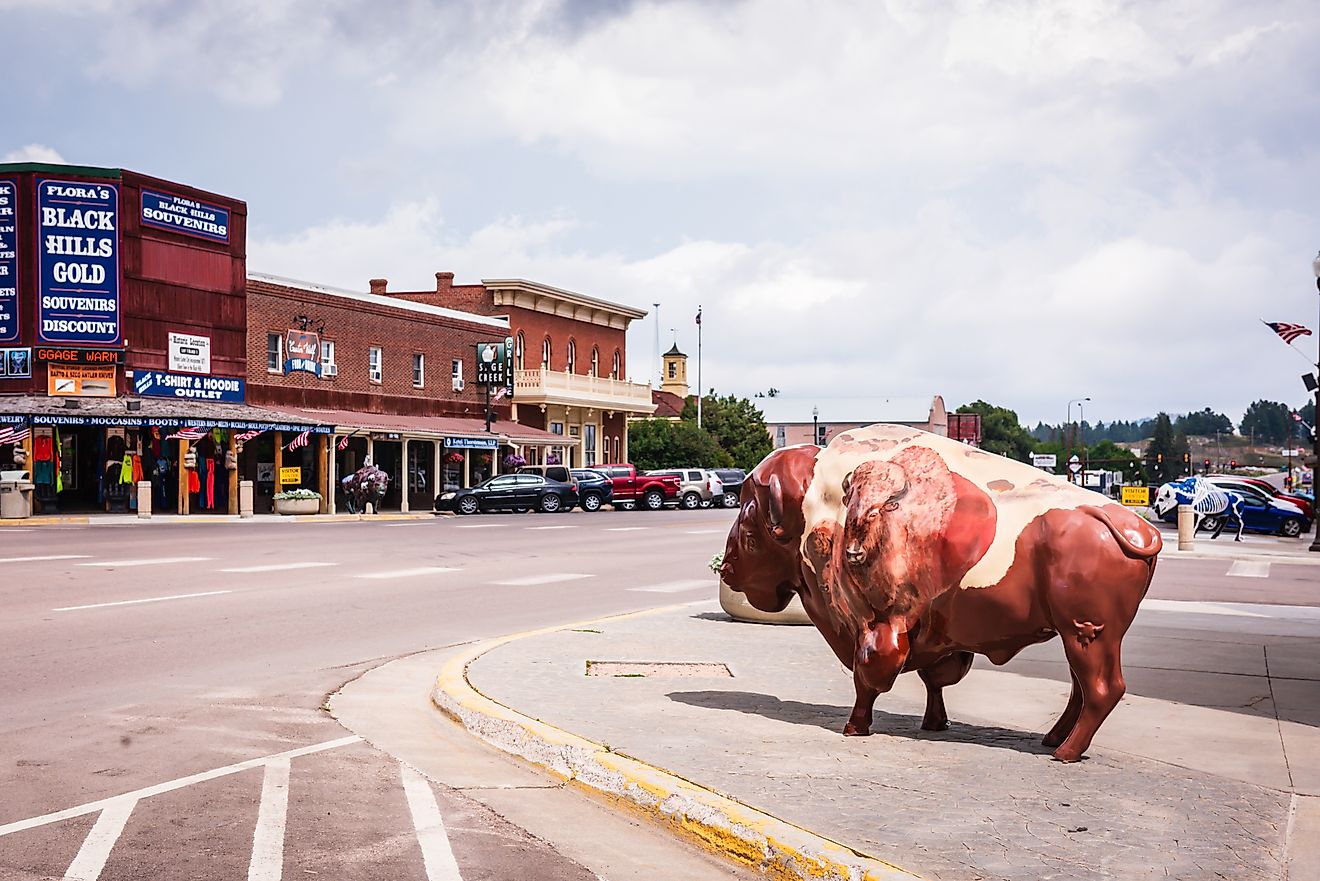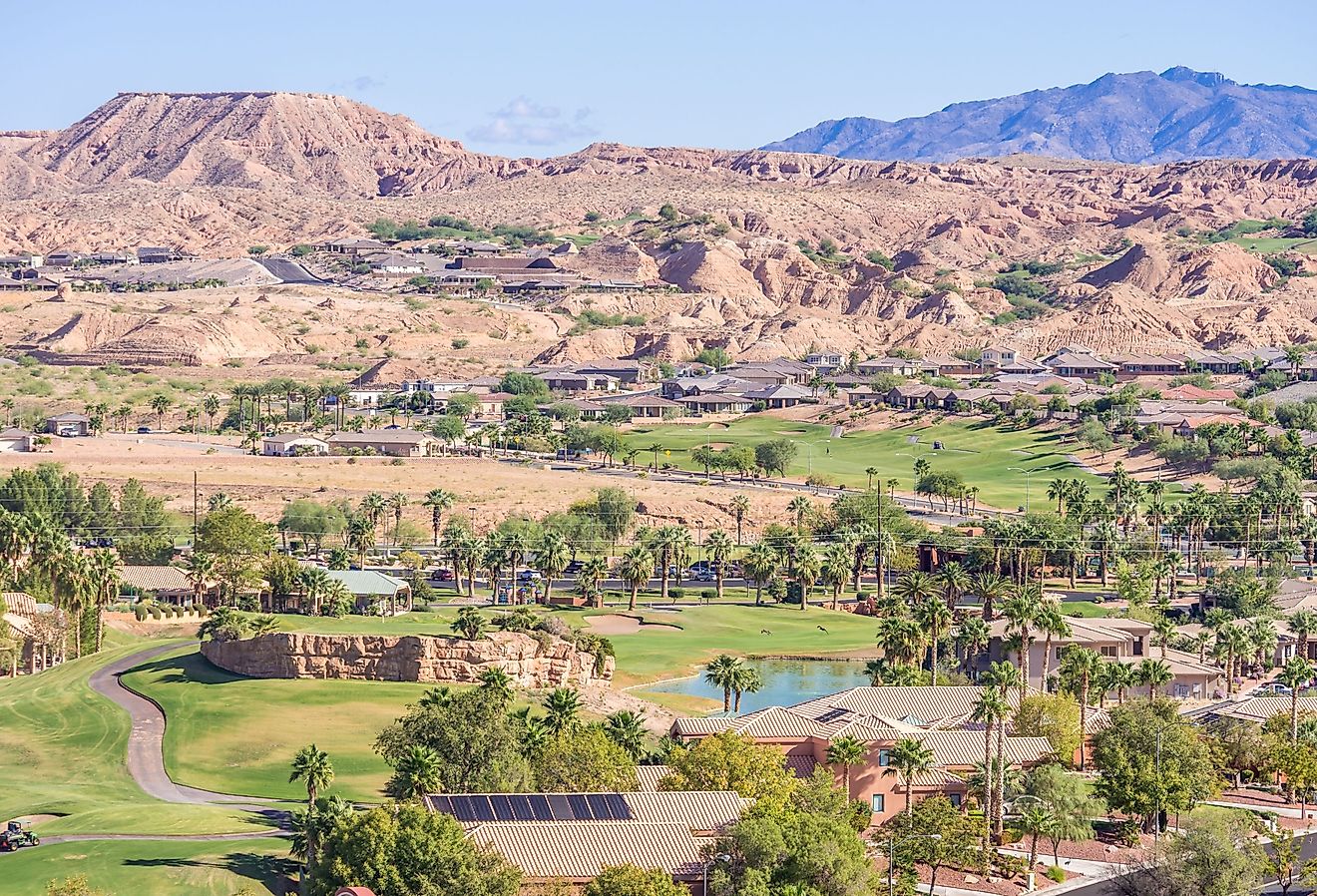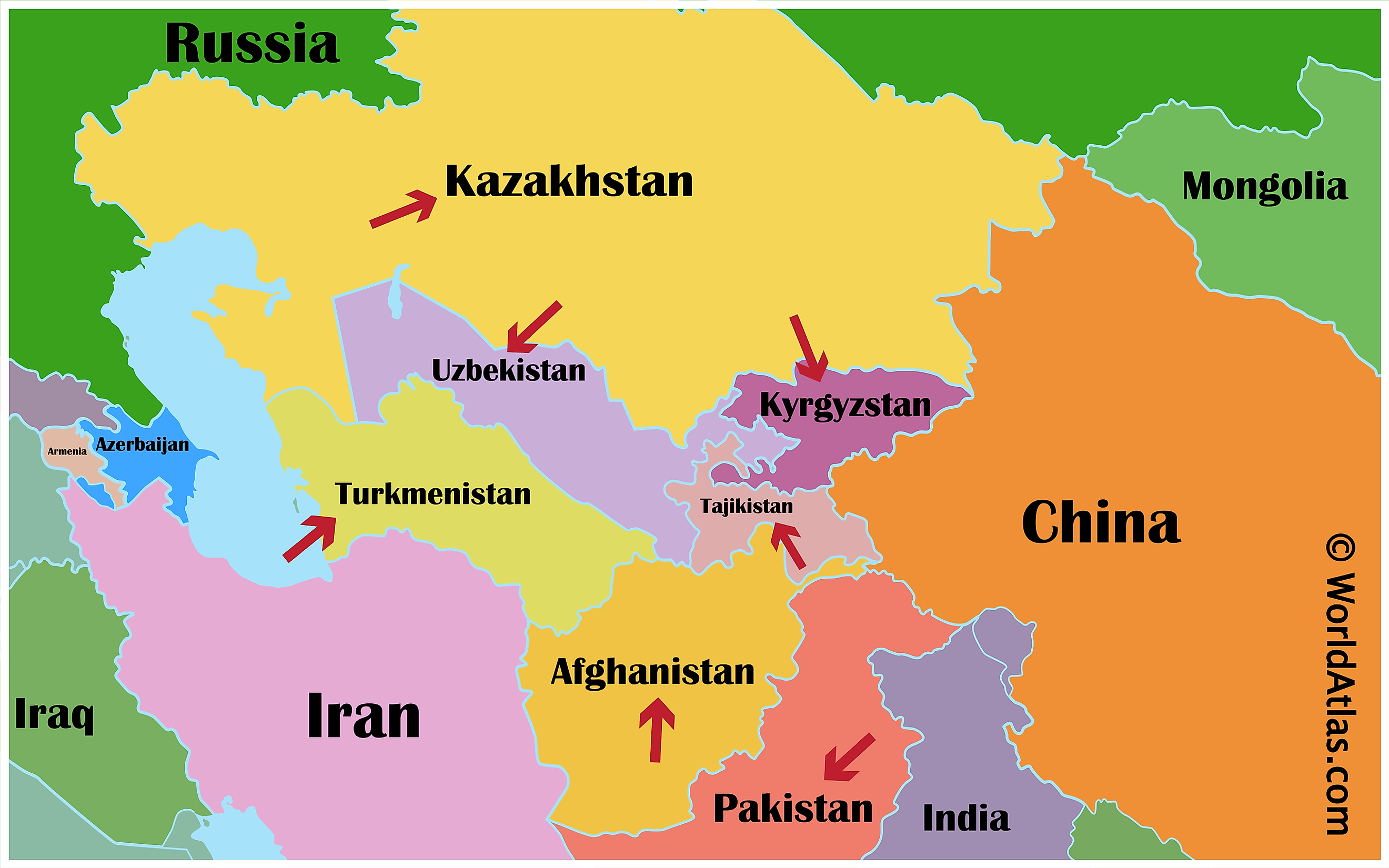
All About the "Stan" Countries
Central Asia, home to the "Stan" countries, offers a unique blend of cultural and natural wonders. The term "stan" is derived from the Persian suffix "-stan", which means "land of". It is used to refer to a group of Central and South Asian countries: Kazakhstan, Kyrgyzstan, Tajikistan, Turkmenistan, Uzbekistan, Afghanistan and Pakistan. These countries are all culturally and historically linked, sharing commonalities in language, religion and culture. Their histories are complex and varied, with many of the countries gaining independence following the dissolution of the Soviet Union in 1991. Pakistan was formed in 1947 after the partition of the British Raj, while Afghanistan has its own unique history with different periods of rule and independence.
The Stan Countries
The -Stan Suffix
The suffix "-stan" is an interesting phenomenon found in many different languages but is primarily believed to have originated from the Persian language. It is a widely-used suffix that carries a range of meanings related to place, such as "where one stands" or "place of," and also "land."
When looking at its etymology, it is believed to have been adopted by other nations through contact with Proto-Indo-European languages. The root word 'sta' also has Proto-Indo-European origins and signifies "stands" and "settlement," which can be found in Russian.
Today, the suffix -stan is most commonly associated with central asian countries such as Afghanistan, Pakistan, Kazakhstan, etc., but it can also be seen in other places such as Iran or Turkey. While some linguists suggest that this could be evidence for its relation with Proto-Indo-European languages, others argue that this could be due to its widespread usage across many different cultures. The suffix -stan is not limited to geographical locations either; Frangistan was the term used by Eastern peoples to describe Western Europe during the medieval era.
Another popular explanation for the use of -stan comes from toponymy. Historically, rulers would name newly conquered areas with their own language systems to establish their power over those lands. In ancient Persia, for example, assimilation of these lands was achieved by assigning them a new name consisting of their own homeland concatenated with -stan, thus creating a sense of unity among previously divided territories.
Countries with -Stan Suffix in their English Names
Kazakhstan
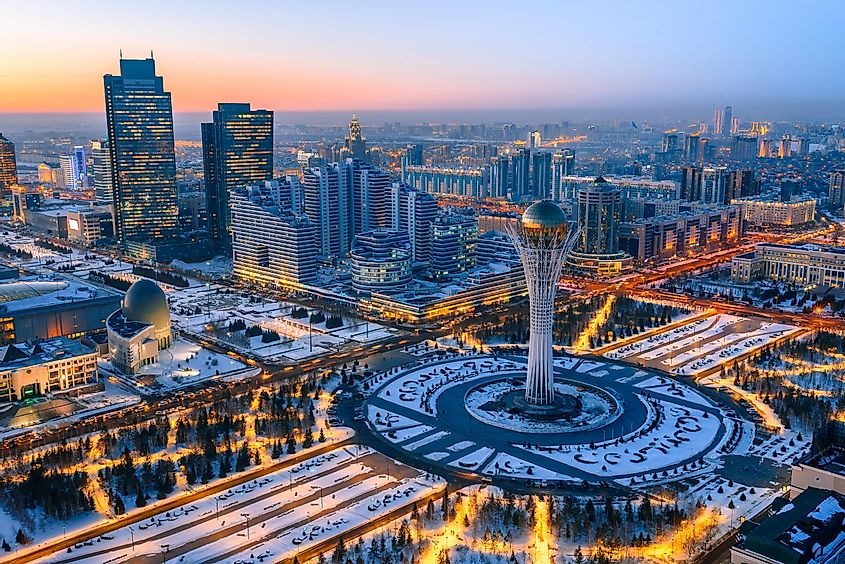
The word "Kazakh" is derived from the Russian word "казах", and refers to members of the Kazakh people. The words is thought to have come from the Turkic word "qaz-" meaning "to wander", alluding to the Kazakhs' nomadic culture. The suffix "-stan" means "land" or "place of" in Persian, so Kazakhstan, written as "Қазақстан" in Kazakh, can be translated as "land of the wanderers". Kazakhstan, the world's largest landlocked country, spans from the Caspian Sea to the Altai Mountains, and borders Russia to the north, China to the east, Kyrgyzstan and Uzbekistan to the south, and the Caspian Sea and Turkmenistan to the west. Its capital, Nur-Sultan (formerly Astana), sits in the heart of Central Asia. With over 2.7 million square kilometers, Kazakhstan boasts a network of rivers, including the Irtysh, Ishim, and Syr Darya, that support agriculture and serve as crucial transportation routes. As a hub of trade and commerce between Europe and Asia, Kazakhstan is home to around 19 million people, made up of Kazakhs, Russians, Ukrainians, Uzbeks, and Tatars, and a rich mix of religions including Islam, Orthodox Christianity, and Protestantism. Kazakh is the official language, with Russian widely spoken and minority groups speaking Uzbek, Tatar, and Ukrainian.
As the largest economy in Central Asia, Kazakhstan boasts a major oil production and investments in mining, metallurgy, and other industries, as well as in infrastructure, transportation, and communications. Abundant FDI and membership in the Eurasian Economic Union and China's Belt and Road Initiative support Kazakhstan's economy. However, the country remains highly dependent on Russia and China, and its economy remains poorly diversified. Corruption, politicization of the judiciary, and concentration of economic power within the elite also challenge Kazakhstan's growth.
Kyrgyzstan
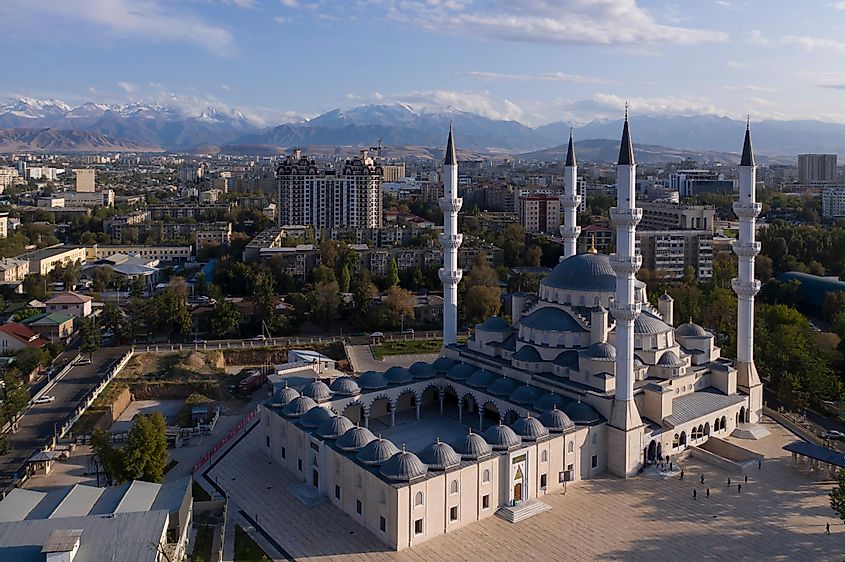
The word "Kyrgyzstan" comes from the Turkic word "kyrgyz", which means "forty", and the Persian suffix "-stan", which means "land of". Therefore, the name Kyrgyzstan is possibly translated as "we are forty". The name is believed to refer to the forty clans that were united by the Kyrgyz people's legendary ancestor, Manas, who founded the Kyrgyz Khanate in the 9th century. The Kyrgyz Republic, also known as Kyrgyzstan, holds a strategic location in Central Asia as a landlocked country. Bishkek is Kyrgyzstan’s capital and largest city. With a population of approximately 6.8 million people as of 2023, this nation comprises a diverse mix of ethnic groups including Kyrgyz, Russian, Uzbek, and Ukrainian communities. The majority of the population speaks Kyrgyz and Russian, while Uzbek is also widely spoken. Kyrgyzstan is a predominantly Muslim country. However, there are also significant populations of other religions, including Russian Orthodox Christianity, as well as smaller communities of Buddhists, Jews, and other beliefs.
Kyrgyzstan has abundant mineral resources, including gold, copper, uranium, mercury, and iron, and has potential in tourism and hydroelectricity. It is strategically positioned as a transit corridor between China, Russia, and Europe and has financial support from multilateral and bilateral donors, as well as China. Kyrgyzstan is a member of the Eurasian Economic Union and China's Belt and Road Initiative. However, the country has a small, open economy that is heavily dependent on Russia, China, and Kazakhstan, and has a strong dependence on gold and agriculture. Political and social instability as well as poverty pose challenges to the country.
Tajikistan
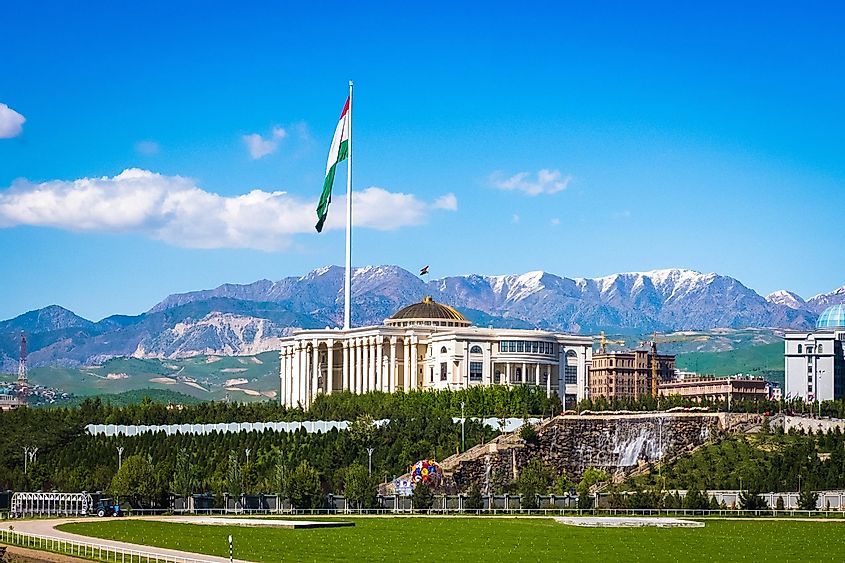
The name "Tajikistan" is derived from the Persian word "Tajik", which historically referred to a Persian-speaking people in Central Asia. The suffix "-stan" in Persian means "land of," so "Tajikistan" means "land of the Tajiks. Tajikistan, officially known as the Republic of Tajikistan, is a country located in the heart of Central Asia and bordered by Uzbekistan to the west and China to the east. Tajikistan’s capital is Dushanbe. With a population of over 9 million people, Tajikistan boasts a rich and diverse culture with Tajik as the main language while Uzbek and Russian are also widely spoken.
Tajikistan boasts a wealth of natural resources, including the potential for hydroelectric power, cotton, aluminum, and gold, as well as untapped opportunities in agriculture and tourism. It is a transit corridor between Uzbekistan, Kyrgyzstan, Afghanistan, Pakistan, and China and is a member of China's Belt and Road Initiative. However, the country is heavily dependent on the Russian economy and China, and is the poorest country in central Asia. The country also faces challenges such as corruption, poor governance, and a challenging business environment, and is at risk of destabilization due to its proximity to Afghanistan and the rising threat of terrorism.
Turkmenistan
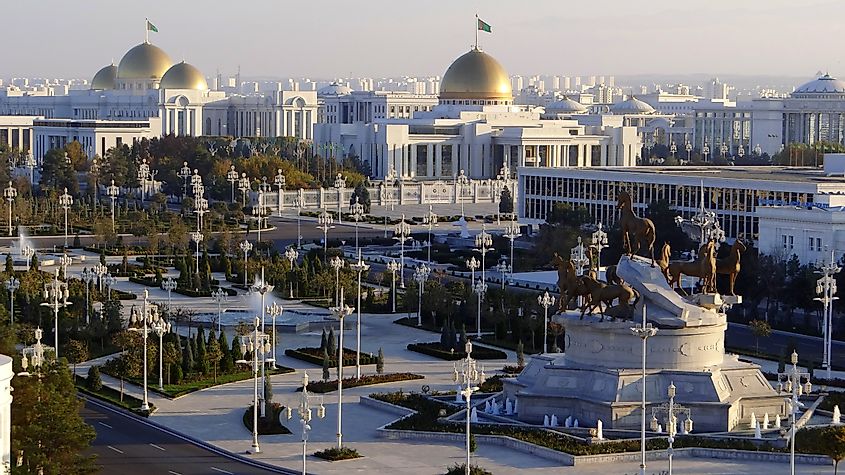
The name "Turkmenistan" comes from the ethnonym "Turkmen," which refers to a Turkic-speaking people who live in the region. The suffix "-stan" means "land of" in Persian, so "Turkmenistan" translates to "land of the Turkmen." Turkmenistan, officially known as the Republic of Turkmenistan, lies in Central Asia, surrounded by Kazakhstan to the north, Uzbekistan to the east, Iran to the south, and Afghanistan to the south-east. The capital city, Ashgabat, is also the largest city in the country. With over 6 million residents, Turkmenistan boasts a rich and diverse culture shaped by influences from Russia and Iran. Turkmen and Russian are the dominant languages, while the majority of the population is Muslim.
Turkmenistan boasts the world's fourth largest natural gas reserves and holds a strategic position between China, Russia, and Europe. However, the economy heavily relies on hydrocarbons, with 60% of exports coming from the sector, and exports nearly 75% of its gas to China. The private sector remains underdeveloped, with state monopolies dominating the economy. The business environment is challenging with strict trade, price, and foreign exchange restrictions, and the transportation and health infrastructure remains underdeveloped. Corruption, authoritarianism, repression, politicization of the judiciary, and an opaque statistics system weaken the governance. The porous border with Afghanistan and weak military resources pose a threat.
Uzbekistan
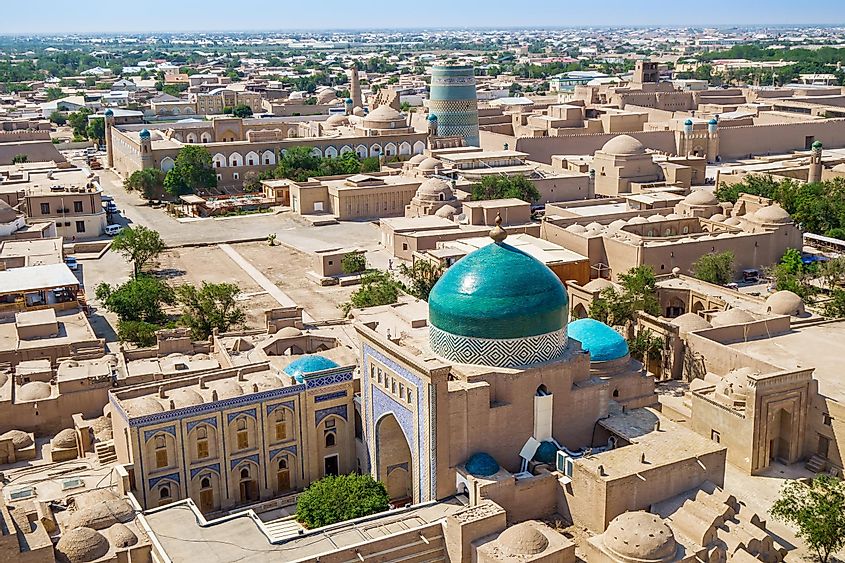
The name "Uzbekistan" is derived from the ethnic name "Uzbek," which refers to a Turkic-speaking people in Central Asia. The suffix "-stan" means "land of" in Persian, so "Uzbekistan" translates to "land of the Uzbeks." Uzbekistan, the Republic of Uzbekistan, lies at the heart of Central Asia with Tashkent serving as its capital. Its northern neighbor is Kazakhstan and to the south lies Afghanistan. The country is home to a rich cultural heritage influenced by Russia and Persia, and Uzbek is the main language with Russian and Tajik also widely spoken. Uzbekistan boasts a population of 35 million people.
Uzbekistan's economy proves more resilient than other countries in Central Asia due to its diversification and reduced vulnerability to external shocks. Abundant natural resources such as gas, gold, copper, and hydroelectric potential, as well as being a major cotton exporter, fuel the economy. With a youthful population and support from the international financial community, Uzbekistan is implementing economic reforms to attract foreign investment. However, the country remains highly dependent on Russia and China, with the economy still largely relying on commodities and expatriate remittances. Uzbekistan faces challenges, including limited manufacturing, high unemployment, and slow institutional progress.
Afghanistan
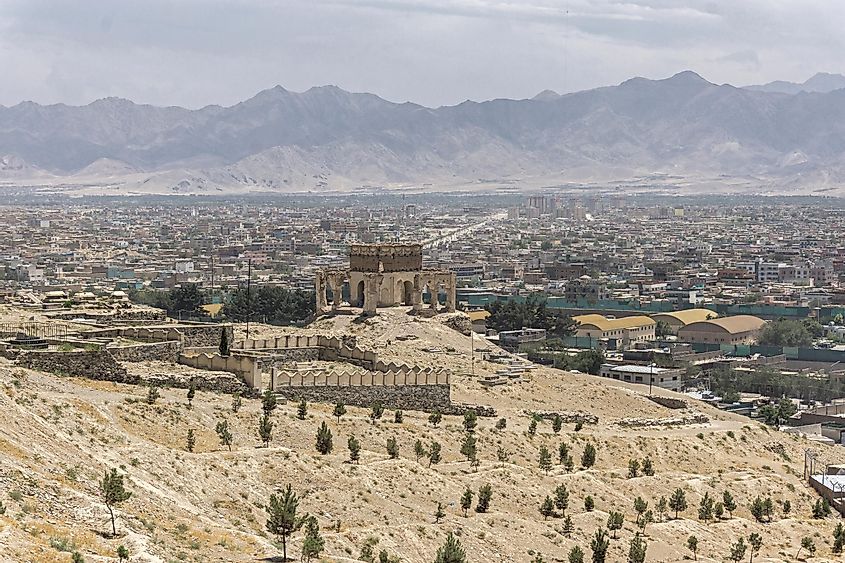
The name "Afghanistan" comes from the Pashto word "Afghan", which refers to the Pashtun people, the largest ethnic group in the country. The suffix "-stan" means "land of" in Persian, so "Afghanistan" translates to "land of the Afghans." Afghanistan, known officially as the Islamic Republic of Afghanistan, borders Pakistan to the east, Iran to the west, Turkmenistan to the north, and Uzbekistan to the northwest. Kabul serves as its capital. With a population of around 40 million, Afghanistan boasts a diverse and culturally rich society with ethnicities like Pashtun, Tajik, Hazara, Uzbek, and Turkmen. Pashto and Dari are its official languages. Afghanistan has a history marked by prosperity and cultural achievements, as well as conflict and instability.
The potential for economic growth exists in Afghanistan through the exploitation of its commodities such as gas, oil, and minerals. International aid, including UN programs, provides financial support. However, the Taliban's takeover has resulted in the loss of international development assistance and dependence on agriculture makes the country vulnerable to weather and other factors. High poverty levels pose economic challenges, along with inadequate infrastructure, poor governance, ethnic fragmentation, and the presence of terrorism.
Pakistan
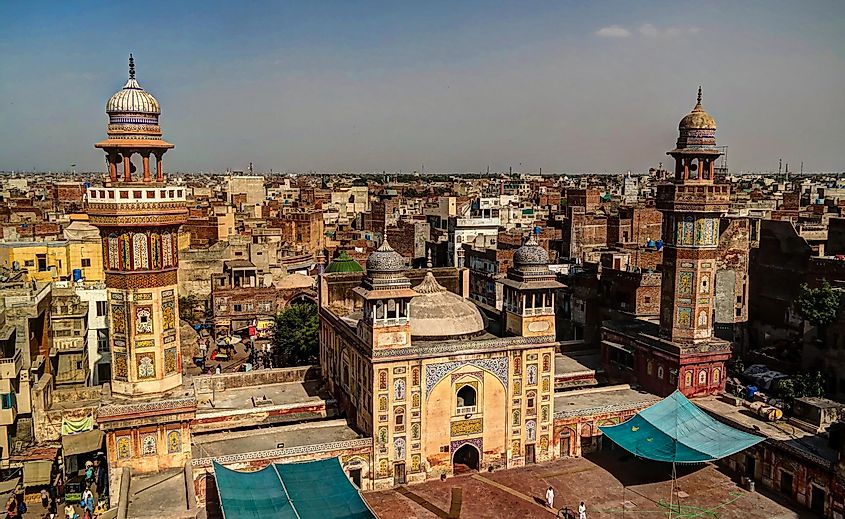
The name "Pakistan" is a combination of two Persian words, "Pāk" meaning "pure" or "clean," and "stan" meaning "land of." Therefore, "Pakistan" translates to "land of the pure." The name was coined in the 1930s by Choudhary Rahmat Ali, a Pakistani nationalist. Pakistan, officially known as the Islamic Republic of Pakistan, is a South Asian country with a population of over 200 million. It is home to the capital city of Islamabad and is bordered by India, Afghanistan, Iran, and China. The cultural heritage of Pakistan is diverse, encompassing Punjabi, Sindhi, Pashtun, Balochi, and Kashmiri ethnicities, with Urdu as its national language. English, Punjabi, Sindhi, Pashto, and Balochi are also widely spoken. In 1947, Pakistan won its independence from Britain and became the Islamic Republic of Pakistan.
Despite facing political turmoil, economic struggles, and conflict with India, Pakistan boasts a thriving internal market, driven by its youthful demographic and substantial remittances from migrant workers. With an abundant and low-cost labor force, economic connections to China and Central Asia, and a key role in Islamic finance, Pakistan has great potential for growth. However, the country faces challenges such as political instability and insecurity, widespread informality, inadequate education, health, and infrastructure, particularly in rural areas. Additionally, the economy of Pakistan is heavily dependent on agriculture and is vulnerable to climate change and global market fluctuations, with a strong reliance on imports for its energy needs.
The Central Asian "stan" countries offer an interesting study of nations with centuries-old histories and complex political landscapes that have evolved due to various global influences, including Russia and Britain's colonial rule in the 19th century. Each country boasts its own unique culture that reflects both its history and contemporary influences from neighboring countries such as Iran or India. Despite their differences, these countries share common elements in language, religion, geography, economy, history, culture, politics, and more.
Stan Country Names In Various Other Languages
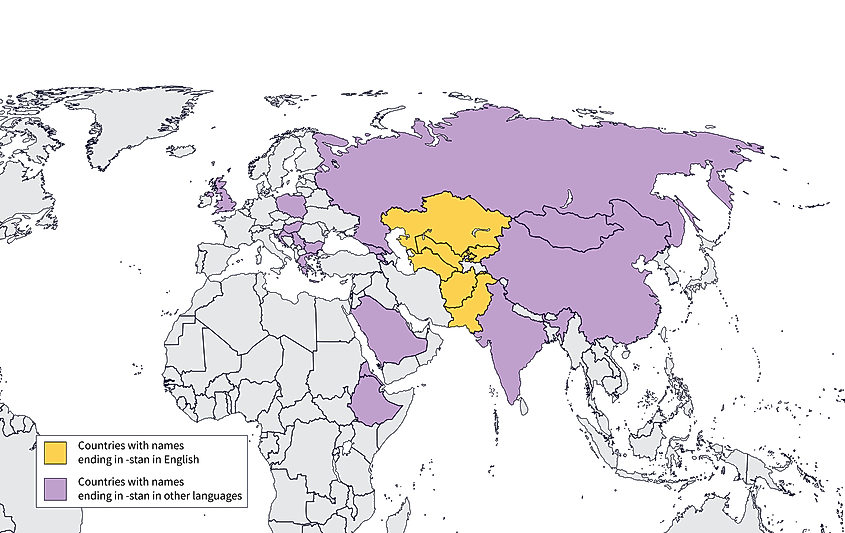
Countries with Names Ending in -Stan
| English name | Name in Other Languages | |
|---|---|---|
| Armenia | Persian | Armanestân |
| Turkish | Ermenistan | |
| Armenian | Hayastan | |
| Azerbaijani | Ermənistan | |
| Turkmen | Ermenistan | |
| Tatar | Ärmänstan | |
| Bashkir | Ärmänstan | |
| Hindi | Armanistān | |
| Urdu | Armanistān | |
| Bulgaria | Persian | Bulgharestân |
| Turkish | Bulgaristan | |
| Azerbaijan | Bolqarıstan | |
| Tatar | Bolğarstan | |
| Urdu | Bulgharistân | |
| China | Armenian | Čʿinastan |
| Croatia | Turkish | Hırvatistan |
| Tatar | (alternative Xırwatstan) | |
| **England | Persian | Engelestân |
| Hindi | Iṅglistān | |
| Urdu | Inglistān | |
| **Ethiopian Empire (Ethiopia & Eritrea) | Turkish | (formerly Habeşistan) |
| Armenian | (formerly Habešstan) | |
| Azerbaijani | (formerly Həbəşistan) | |
| Tatar | (formerly Xäbäşstan) | |
| Uyghur | (formerly Hebeshistan) | |
| Georgia | Persian | Gorjestân |
| Turkish | Gürcistan | |
| Armenian | Vrastan | |
| Azerbaijani | Gürcüstan | |
| Tatar | Görcistan | |
| Hindi | Gurjistān | |
| Urdu | Gurjistān | |
| Greece | Turkish | Yunanistan |
| Armenian | Hunastan | |
| Azerbaijani | Yunanıstan | |
| Tatar | Yunanstan | |
| Hungary | Persian | Majarestan |
| Turkish | Macaristan | |
| Azerbaijani | Macarıstan | |
| Kazakh | Majarstan | |
| Turkmen | Majarystan | |
| Tatar | Macarstan | |
| Mongolia | Persian | Mogholestan |
| Turkish | Moğolistan | |
| Azerbaijani | Monqolustan | |
| Tatar | Moñğolstan | |
| Poland | Persian | Lahestân |
| Turkish | (formerly Lehistan) | |
| Armenian | Lehastan | |
| Tatar | Läxstan | |
| Uyghur | Lehistan | |
| Hindi | Lahistān | |
| Russia | Armenian | Ṙusastan |
| Saudi Arabia | Persian | Arabestân-e Sa'udi |
| Turkish | Suudi Arabistan | |
| Azerbaijani | Səudiyyə Ərəbistanı | |
| Turkmen | Saud Arabystany | |
| Tatar | Sögüd Gäräbstanı | |
| Uyghur | Se'udi Erebistan | |
| Bashkir | Säğüd Ğäräbstanï | |
| Serbia | Persian | Serbestân |
| Turkish | Sırbistan | |
| Tatar | (alternative Sırbstan) | |
| India | Persian | Hindustan |
** England is not a country; it is part of the United Kingdom. The Ethiopian Empire spread over the countries we now know as Ethiopia and Eritrea.


